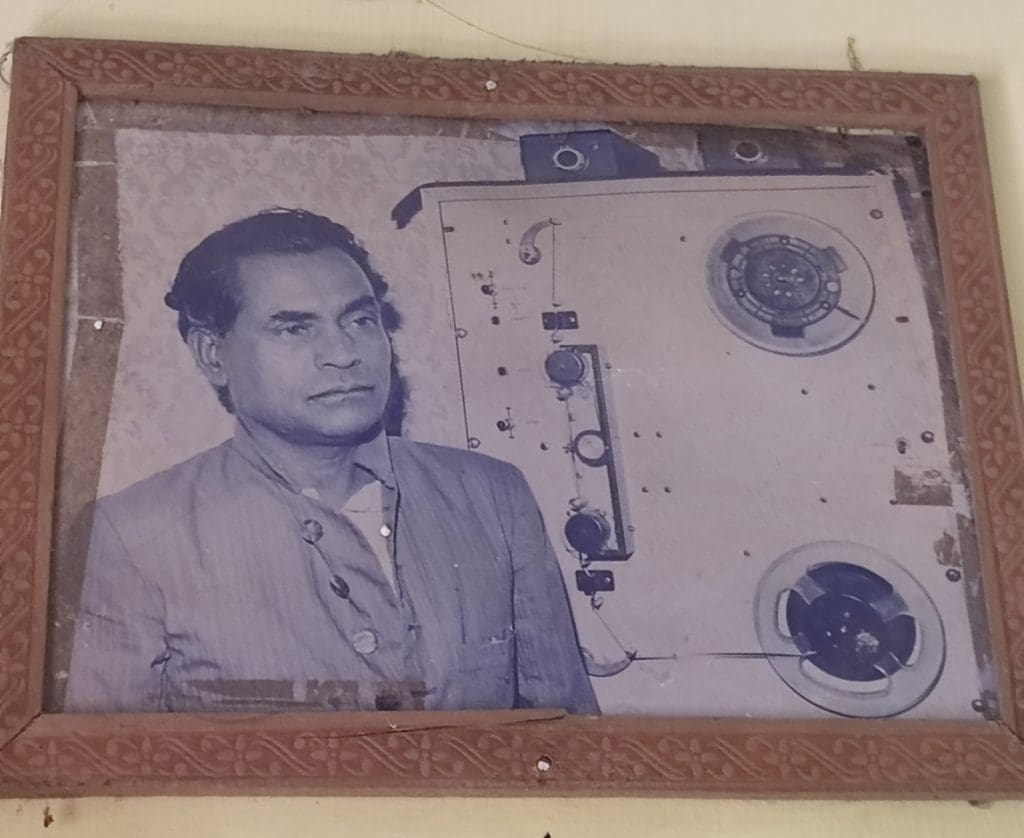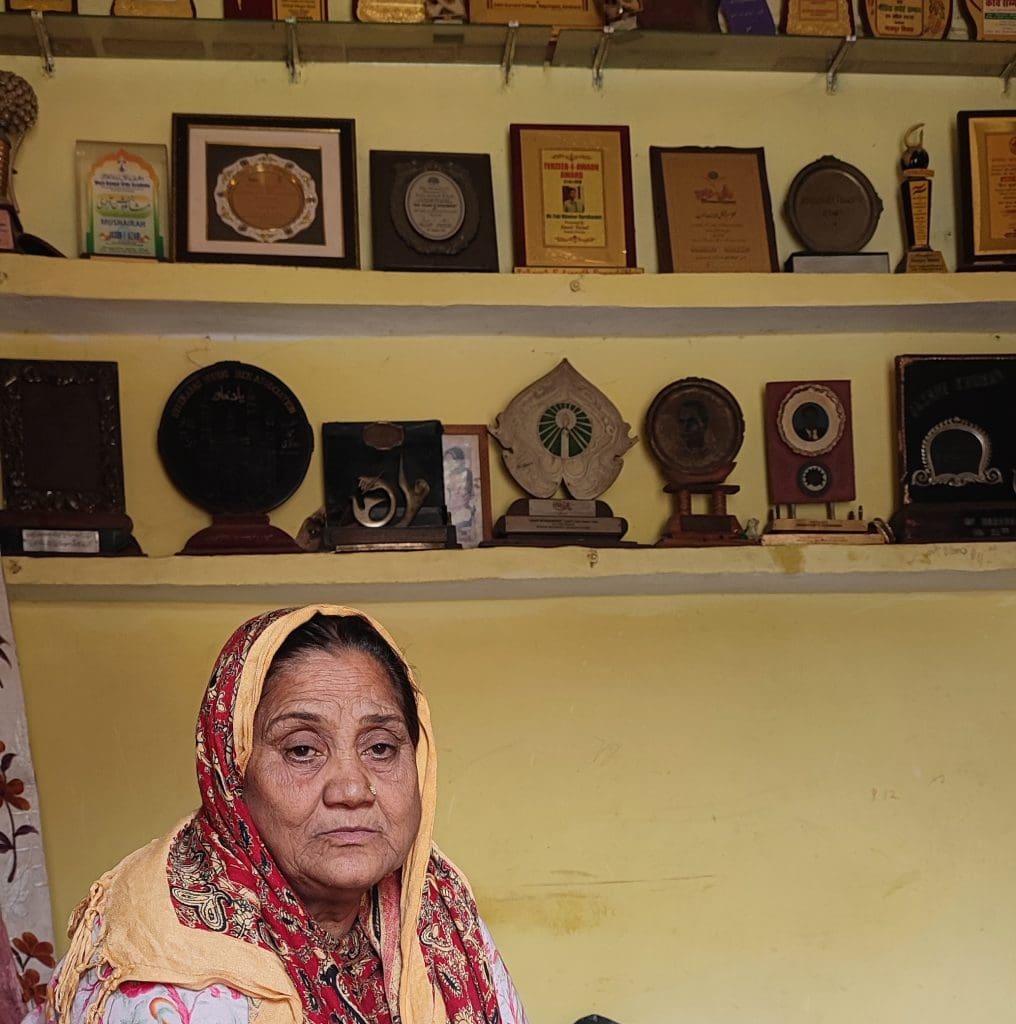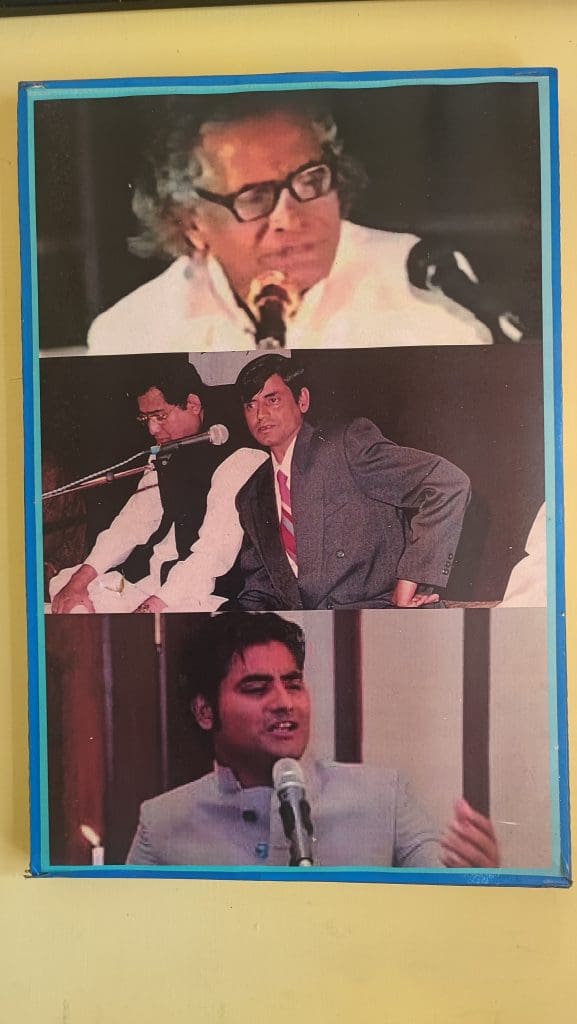
Astha Chaudhary, Dipti Arora and Akshit Sharma
Na Haara Hai Ishq Na Duniya Thaki Hai
Diya Jal Raha Hai Hawa Chal Rahi Hai
Three of us, all friends, were listening the ghazals of Khumar Barabankvi as we landed up in the search of the mazaar of thesame famous Urdu poet in the Barabanki district of Uttar Pradesh. First, we reached the Khumar Academy situated in the civil lines area of this district of Uttar Pradesh. The academy appears to be as old as the remains of times. The building in the old architecture lies abandoned. Trees had outgrown the walls in the academy, with the windows and doors rusted and full of dust.
From there, we started the search for his home. On contacting some acquaintances in Lucknow, we got his exact address and the name of his grandson Faiz Khumar, who still performs internationally in mushairas.
We somehow managed to reach the Barabanki market which was in its full blaze in the early hours of the morning. In those narrow streets, the shops of sweets, colourful dupattas, bangles were still opening, people were gearing out for their daily chores. Smell of freshly baked sweets and breakfast -like samosas, kachoris, pakodis, puri, gujiya, jalebi – were the most tempting ones. As we approached further, we asked a man the address of Khumar saheb, he pointed to a blue tempo (large autorickshaw) parked at a distant in front of which was Khumar saheb’s home. We walked towards the tempo, and entered into a narrow lane in which the haveli of Khumar saheb was situated. The old architecture haveli stood in remains upholding its legacy. A huge verandah, with a tree, walls shedding off its blue paint and a narrow staircase above which there was a board mentioning the name of Khumar saheb and the leading generations.
Climbing up on the staircase, we saw there was a mat and a pillow lying on the floor, and felt as someone had soaked themselves in the morning sun before starting off the day. As we turned around, there was a door opened, making us more curious. As we knocked on the door, a lady in her 60s came and asked “जी बताइये, किस से मिलना है?” (Yes, please tell whom do you want to meet?)


Seeing her, our smiles widened and we asked “Is this the house of Khumar Sahib?”
She looked confused and replied “Yes, this is his house. Who are you?”
One of us excitedly replied “We have reached here searching for his house. We are his fans.”
She laughed and said loudly “Oh, please come. You all are Abba’s fan.”
She opened the next door to the baithak and let us in. The baithak was adorned with the awards and trophies of Khumar saheb, his son and grandson had earned in their lives. The woman welcoming us was his daughter-in-law Farida. Meeting Farida jee made our day. It felt as if we had gone as fans of Khumar saheb but we returned as huge fans of Farida jee. Embracing about the shayaari and the poetry of Khumar saheb and her husband Suroor Khumar Barabankvi, she expressed how she loved each and every shers of them.
Sitting in the drawing room where Khumar saheb used to sit with various famous shayars and poets was an amazing feeling for all of us. Farida jee talked about how the biggest of the shayars from Faiz Ahmed Faiz who visted during Indo-Pak mushaira, Waheeda Rehman jee, Shabana Azmi jee and others had visited their place and had sat in the room. The room used to be full of people and shayars in the early times. No one was allowed to visit inside the house. Except Rahat Indori saheb and Noor Indori saheb, who would come inside sometimes. Recently, her granddaughter Sheeba had recited the sher of Rahat Indori saheb and in turn Indori saheb also appreciated her and blessed her. Embracing at the talent of her granddaughter Sheeba, she laughed and said “we shall make her the shaayara now.”
On asking about how was Khumar saheb in his personal lives, she explained that he was a simple, disciplined man, who managed the entire family himself rather than being self centered. He was a strict man in his terms, that he did not concentrate on accumulating wealth for his family alone. He believed the accumulated wealth shall make his children lazy, spoilt.
When people ask her “Khumar saheb ne ek bhi gharnahi banwaya?”, she explains that Khumar saheb did not believe in building huge houses, he believed in the concept of family. If any of his brother would ask them anything, he would immediately give them that. For his children, he focussed on making them learn the necessary taaleem, art. Khumar saheb loved and respected his wife too much. Though women were not allowed much to go in the outside world, but he used to write for his wife and recite those couplets. Khumar saheb loved his place Barabanki, that in his last days he shifted to Barabanki and died there.


Farida jee, the lady with a big heart, beautiful smile and a huge enthusiasm is a perfect example of how self-love can sustain a person and can help overcome societal barriers without compromising on one’s curiosity and learnings. Though it was difficult for women in the house to interact with the outside world and to pursue their freedom at their will, she never stopped learning and exploring in whatever opportunity she got. She appeared to be the live performer lady who not only believed in narrating stories but living and internalising those stories as well. Her husband who was also a famous urdu shayar named Suroor Barabankvi jee, passed away at a very early age. Her memories took her back to the times where she had the chance of visiting mushairas with her husband, Suroor saheb.
Embracing her struggle, she would also keep remembering in between how beautiful she looked in her young age. On asking about if she wanted to become a shaayara, she confidently exclaimed that if she would have gotten a chance, she would have become a shaayara, but not carrying any baggage of regrets in life she lived life struggling to raise her 4 children after her husband had passed away at an early age.
Pointing out to the political atmosphere, Farida jee remembered that how people in earlier times used to visit homes for votes. But now it has become difficult, she felt that politics and leaders have moved away from people. She also felt that now the politics had become filthier and always advised her son Faiz, to maintain the principles and integrity of the shayari and poetry he performed. She believed that a good performer doesn’t need to inculcate biases in his/her art rather should use his art creatively to raise questions, to say things even in the hardest of times without hurting anyone’s sentiments. Narrating an incident that Nazir Khayami had read a ghazal criticising Morarjee Desai when he was the Prime Minister. The District Magistrate (DM) sat in the room and said that the ghazal should not be recited. The public at that time had told that this ghazal will be recited here only,and thus at the will of the public, the ghazal was sung, the DM left the room but the will of the people and the right of speech of Khayami jee was upheld. With a huge smile she said:
“shaayar ko koi rok bhi nahi sakta hai kabhi”.
Charagon Ke Badle Makaan Jal Rahe Hain
Naya Hai Zamana Nayi Raushani Hai
Farida jee in her early sixties today calls the current days as days of reading, and taking care of herself and the family. Being the eldest now in the family, she has seen numerous losses in this life and is now struggling herself with diabetes,noticing her body and strength fading away, but keeping the charm intact.
On being asked if the family receives any royalty from the songs and books of Khumar saheb, she denied that family receives nothing. She shared that a lot of people have asked her to approach the courts and fight as she has the right to royalty from the songs being played and the books being sold. But her health now doesn’t allow to go from court to court, she has tried writing letters to the ministers but has not received any response so far. 2 days previous to this meeting, the death anniversary of Khumar saheb had passed, leaving behind his legacy and poetry.
Wahi Fir Mujhe Yaad Aane Lage Hain
Jinhein Bhoolne Mein Zamane Lage Hain
Astha Chaudhary is an ecologist, who loves to explore stories, Lucknow while Dipti Arora is field researcher, in search of stories. Akshit Sharma is a film maker, lifelong student and an avid reader of Urdu poetry.



